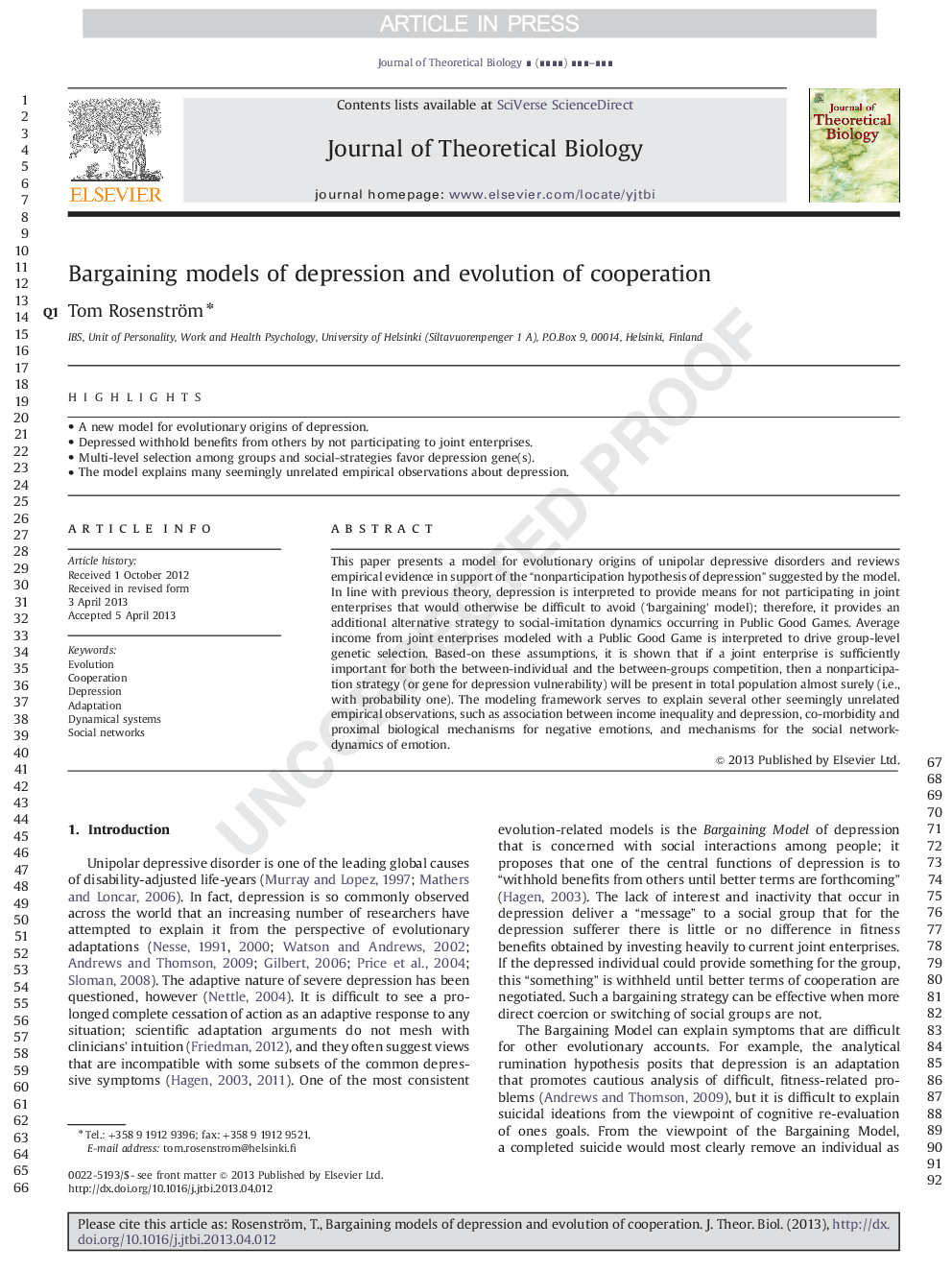| کد مقاله | کد نشریه | سال انتشار | مقاله انگلیسی | نسخه تمام متن |
|---|---|---|---|---|
| 6370792 | 1623879 | 2013 | 12 صفحه PDF | دانلود رایگان |
عنوان انگلیسی مقاله ISI
Bargaining models of depression and evolution of cooperation
ترجمه فارسی عنوان
مدلهای تعاملی افسردگی و تکامل همکاری
دانلود مقاله + سفارش ترجمه
دانلود مقاله ISI انگلیسی
رایگان برای ایرانیان
کلمات کلیدی
اجناس عمومی، اختلال افسردگی، انطباق، سیستم های دینامیک، شبکه های اجتماعی،
ترجمه چکیده
این مقاله یک مدل برای ریشه های تکاملی اختلالات افسردگی یکپارچه ارائه می دهد و شواهد تجربی را در حمایت از یک فرضیه عدم پذیرش افسردگی بررسی می کند. پیشنهاد شده توسط مدل. مطابق با تئوری قبلی، افسردگی به معنای ارائه معنی برای عدم شرکت در شرکت های مشترک است که در غیر این صورت دشوار است برای جلوگیری از (مدل "چانه زنی")؛ بنابراین، آن را یک استراتژی جایگزین اضافی برای پویایی تقلید اجتماعی که در بازی های عمومی خوب فراهم می کند، فراهم می کند. میانگین درآمد شرکت های سازمانی با یک بازی عمومی خوب تفسیر شده است تا بتواند انتخاب ژنتیکی گروهی را انجام دهد. بر اساس این فرضیه، نشان داده شده است که اگر یک شرکت مشترک برای هر دو رقابت بین فردی و بین گروهی به اندازه کافی مهم باشد، پس از آن یک استراتژی غیر اختصاصی (یا ژن برای آسیب پذیری افسردگی) تقریبا مطمئنا در مجموع جمعیت (یعنی ، با احتمال یک). چارچوب مدل سازی به توضیح چندین نظرسنجی تجربی ناسازگار و غیرمستقیم مانند ارتباط بین نابرابری درآمد و افسردگی، عوارض همبستگی و مکانیسم های بی روحی بیولوژیکی برای احساسات منفی و مکانیزم های پویایی احساسات اجتماعی می پردازد.
موضوعات مرتبط
علوم زیستی و بیوفناوری
علوم کشاورزی و بیولوژیک
علوم کشاورزی و بیولوژیک (عمومی)
چکیده انگلیسی
This paper presents a model for evolutionary origins of unipolar depressive disorders and reviews empirical evidence in support of the “nonparticipation hypothesis of depression” suggested by the model. In line with previous theory, depression is interpreted to provide means for not participating in joint enterprises that would otherwise be difficult to avoid ('bargaining' model); therefore, it provides an additional alternative strategy to social-imitation dynamics occurring in Public Good Games. Average income from joint enterprises modeled with a Public Good Game is interpreted to drive group-level genetic selection. Based on these assumptions, it is shown that if a joint enterprise is sufficiently important for both the between-individual and the between-groups competition, then a nonparticipation strategy (or gene for depression vulnerability) will be present in total population almost surely (i.e., with probability one). The modeling framework serves to explain several other seemingly unrelated empirical observations, such as association between income inequality and depression, co-morbidity and proximal biological mechanisms for negative emotions, and mechanisms for the social network-dynamics of emotion.
ناشر
Database: Elsevier - ScienceDirect (ساینس دایرکت)
Journal: Journal of Theoretical Biology - Volume 331, 21 August 2013, Pages 54-65
Journal: Journal of Theoretical Biology - Volume 331, 21 August 2013, Pages 54-65
نویسندگان
Tom Rosenström,
